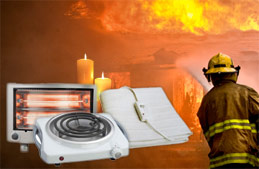Fire Safety on Campus
Posted in Accident & Injury on September 4, 2013
 According to the U.S. Fire Administration there are over 3,800 university housing fires each year. While dormitories are usually furnished with smoke alarms, sprinkler systems, and other safety measures, off-campus housing is not always as well-equipped. Campus Firewatch states that four out of five campus-related fire deaths occur in off-campus housing, where approximately two-thirds of our students live.
According to the U.S. Fire Administration there are over 3,800 university housing fires each year. While dormitories are usually furnished with smoke alarms, sprinkler systems, and other safety measures, off-campus housing is not always as well-equipped. Campus Firewatch states that four out of five campus-related fire deaths occur in off-campus housing, where approximately two-thirds of our students live.
Cooking is the leading cause of campus fires (88 percent), followed by arson; careless smoking; unattended candles; and overloaded extension cords, power strips and outlets. If your child is going away to college, please share this important fire safety tips.
Frequently prohibited items may cause a fire
- Cooking Appliances – this includes electric skillets, hot plates, coffee makers/hot pots and toaster ovens
- Open flames and other burning items – despite being banned by most campuses, candles and incense account for 20 percent of dorm room fires
- Extension cords and “octopus” plugs – be sure not to overload electrical outlets and only use approved surge protectors
- Electric blankets or sheets
- Space heaters
Permissible items may still pose a risk
- Unplug hairdryers, curling irons, flat irons when not in use
- Smoking – Students should only smoke in designated areas and make sure to completely extinguish all smoking materials
- Only iron clothes on flame-resistant surfaces and unplug the iron when not in use
- Make certain all appliances are UL approved
Reduce “fuel” that may feed a fire
- Keep your room neat – clothes and papers strewn about can cause a small fire to spread quickly
- Empty the garbage frequently
- Keep posters and other flammable wall decorations to a minimum
- Do not cover lights with fabric such as curtains, scarves or tapestries
Use common sense:
- Don’t tamper with or try to cover up smoke detectors
- Never hang anything on the sprinkler heads
- Do not activate fire alarms or call 9-1-1 unless there is an actual emergency
For more information, visit the U.S. Fire Administration website: www.usfa.fema.gov/citizens/college